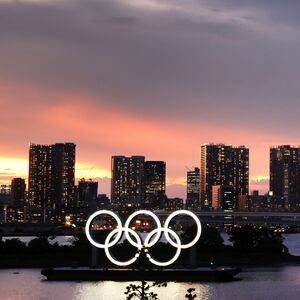It’s the kind of Olympic record nobody wants to see: 3,177 new coronavirus cases announced Wednesday, Tokyo’s worst single day of the pandemic.
But as the Olympic host city struggles to contain the spread of COVID-19, athletes quarantining after testing positive at the Games say that’s no reason to keep them locked up for days in “inhuman” conditions with no fresh air.
A Dutch skateboarder turned to Instagram Wednesday to describe how she led an eight-hour strike to get her first breath of outside air in a week. Candy Jacobs tested positive for the coronavirus on July 21 and has since been held at a quarantine hotel 20 minutes from the Olympic Village with three fellow athletes and two coaches from the Dutch team.
ADVERTISEMENT
The 31-year-old says she came to Tokyo in the best form of her life, ready to be a contender as her sport made its Olympic debut. Instead, she had to watch from a cubicle-style hotel room, its window bolted shut, as 13-year-old Momiji Nishiya led a teen clean sweep of the women’s street competition.
Seven days in, and still testing positive, she said she’d had enough. “Not having any outside air is so inhuman,” she said in an Instagram update to her fans. “It’s mentally super-draining.”
After deciding to “go on strike for outside air,” Jacobs and her teammates sat down and refused to budge. “We didn’t move until something happened and eventually, at the end of the day—I think it took something like seven or eight hours—we came to a deal.
“Now we get to stand in an open window for 15 minutes a day. Under supervision, but having that first breath of outside air was the saddest—and the best—moment of my life.”
For the residents of the Japanese capital, trying their best to go about their daily lives but barred from attending the spectator-free Tokyo Games, Jacobs’ story—and those of other athletes and officials forced into quarantine—might seem like a sideshow. After successfully containing the virus in the early days of the pandemic, Tokyo is under its fourth state of emergency as Japan struggles to cope with the super-infectious Delta variant.
The fear in the run-up to these Games was that the arrival of thousands of athletes, coaches, and assorted Olympic hangers-on was a recipe for disaster, a superspreader event waiting to happen. In fact, the threat now appears to be coming from the other direction: Mass testing of accredited Olympic participants has produced a positivity rate of around 0.02 percent; outside the Olympic bubble, that rises to as high as 20 percent.
Jacobs, who is still testing positive for the virus but has not shown any symptoms, accepts the needs for quarantine but not the conditions in which athletes are being held. She has been backed by the Dutch team, whose technical director, Maurits Hendriks, said the lack of daylight and ventilation—and the tiny boxes of Japanese food they are given to eat—were “unacceptable.”
“This ride has been the wildest I’ve ever been on,” Jacobs added. “And I hopefully will never have to go through something like this again.”







